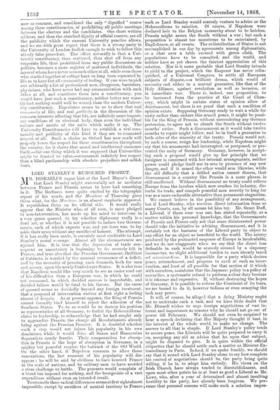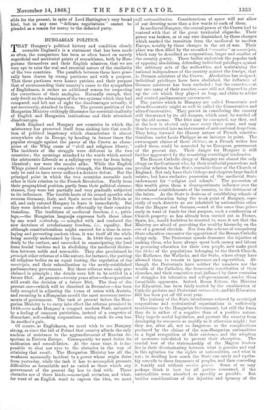LORD STANLEY'S RUMOURED PROJECT.
1111. DISRAELI'S vague hint at the Lord Mayor's dinner I/1 that Lord Stanley might successfully act as mediator between France and Prussia seems to have had something in it. The Berliners were quite excited by the telegraphic report of his words, and the illoniteur of Thursday gives them what, for the illaniteur, is an almost emphatic approval. It republishes them on its official side. It would really appear that the Minister who, of all men, is most pledged to non-intervention, has made up his mind to intervene in a very grave quarrel, to try whether diplomacy really is a dead art, or whether it is not possible to induce two Govern- ments, each of which expects war, and yet fears war, to lay aside their arms without any sacrifice of honour. The attempt, if it has really been made, is certainly most creditable to Lord Stanley's moral courage. Almost all the circumstances are against him. It is true that the depression of trade con- sequent on uncertainty is beginning to be severely felt in France, and true also that the Prussian Government, thriftiest of Cabinets, is worried by the unusual occurrence of a deficit, and by the necessity of pressing such demands, both for men and money, upon the newly Confederate States. It is also true that Napoleon would like very much to see an easier road out of his difficulties than a European war, in which he could not command, in which decided success is improbable, and decided failure would be fatal to his throne. But the cause of quarrel seems so decidedly beyond any foreign treatment, that a proposal of intervention excites at first sight a feeling almost of despair. As at present appears, the King of Prussia cannot formally bind himself to reject the adhesion of the Southern States. To do so would be to destroy his position as representative of all Germany, to forfeit the Hohenzollerns' claim to leadership, to acknowledge that he had sought only to aggrandize Prussia, the charge all Revolutionists already bring against the Prussian Premier. It is doubtful whether such a step would not injure his popularity in his own dominions, while it would drive all Saxon and Hanoverian Separatists nearly frantic. Their compensation for absorp- tion in Prussia is the hope of absorption in Germany, in a mighty but peaceful empire, the bulwark of the Old World. On the other hand, if Napoleon consents to allow those annexations, the last remnant of his popularity will dis- appear ; he will be said by civilians to have lowered France in the scale of nations, and by military men to have avoided a clear challenge to battle. The peasants would complain of a blood tax imposed for nothing, and the bourgeoisie of a vast expenditure without even an intended result.
Toreconcile these radical differences seems atfirst sightalmost impossible, except by sacrifices of neutral territory to France such as Lord Stanley would scarcely venture to advise or the Hohenzollerns to sanction. Of course, if Napoleon were declared heir to the Belgian monarchy about to be heirless, Prussia might annex the South without a war ; but such a proposition is almost too monstrous to be entertained, by Englishmen, at all events. The redistribution of States is not accomplished in our day by agreements among diplomatists, or a chat over a table covered with green cloth. The populations have to be consulted, and the world, and neither have as yet shown the faintest appreciation of this solution. Nor is it more probable that Lord Stanley intends to yield to the project, which the Emperor has never relin- quished, of a Universal Congress, to settle all European subjects of dispute,—a brilliant dream, which would of necessity end either in a mutual guarantee, like that of the Holy Alliance, against revolution as well as invasion, or in immediate war. There is, indeed, one proposition, to be borrowed from the practice of the Court of Chan- cery, which might in certain states of opinion allow of disarm ament, but there is no proof that such a condition of opinion exists. Supposing Germany ready to wait a while for unity rather than endure this armed peace, it might be possi- ble for the King of Prussia, without surrendering any German pretension, to agree not to absorb the South without twelve months' notice. Such a disarmament as it would take twelve months to repair might follow, and be in itself a guarantee to both sides of the sincerity of the treaty. Prussia would not, by such a course, resign her leadership, while Napoleon might say that his armaments had interrupted, or postponed, or pre- vented the unity of Germany. Germany, however, in accept- ing such a proposal would give up her principle that no foreigner is concerned with her internal arrangements, neither power could pledge itself not to arm in presence of any new danger, and if it armed the other would arm likewise, while the old difficulty that a drilled nation cannot disarm, that disarmament in a country like Prussia is a mere phrase, is still unaffected. Without disarmament no treaty could relieve Europe from the incubus which now crushes its industry, dis- turbs its trade, and compels peaceful men secretly to long for war as a more endurable alternative than permanent stagnation.
We cannot believe in the possibility of any arrangement, but if Lord Stanley, who receives direct information from so many Courts, can, by all means let him try. Mr. Grant Duff, a Liberal, if there ever was one, has stated repeatedly, as a matter within his personal knowledge, that the Governments of Prussia and France only ask that some disinterested power should take the initiative in advising disarmament, and it is certainly not the business of the Liberal party to object to any effort for an object so beneficial to the world. The misery produced by the protracted suspense of Europe is incalculable, and we do not exaggerate when we say that the direct loss definable in cash would be scarcely covered by a sixpenny income-tax, no slight additional burden to men already taxed ad ntsericordiani. It is impossible for a party which desires peace, retrenchment, and progress to cavil at such an inter- vention, and least of all possible for that section of it which with ourselves, maintains that the Japanese policy is a policy of cowardice, a systematic refusal to perform a clear duty because it is irksome and expensive. If, without destroying the hopes of Germany, it is possible to relieve the Continent of its fears, we are bound to do it, however tedious or even annoying the task may prove.
It will, of course, be alleged that a dying Ministry ought not to undertake such a task, and we have little doubt that Mr. Disraeli wishes to urge foreign negotiations of vast in- terest and importance as reasons why he should not go out of power till February. We should not even be surprised to hear a speech declaring that Her Majesty thought it best, in the interest of the whole world, to make no change. The answer to all that is simple. If Lord Stanley's policy tends to secure peace, the Liberals will be quite prepared to carry it on, accepting any aid or advice that he, upon that subject, might be disposed to give. It is quite within the official etiquettes that he should settle such a matter as Minister Ex- traordinary in Paris. Indeed, if we spoke frankly, we should say that it rested with Lord Stanley alone to say how complete his control of negotiations should be, the party being quite willing, if he is, to adopt him entirely. His views on the Irish Church have always tended to disestablishment, and upon most other points he is at least as good a Liberal as Mr. Lowe, who, after a year of determined and almost insulting hostility to the party, has already been forgiven. We pre- sume that personal reasons will make such a solution impos-
Bible for the present, in spite of Lord Hartington's very broad hint, but in any case " delicate negotiations " cannot be pleaded as a reason for mercy to the defeated party.



































 Previous page
Previous page